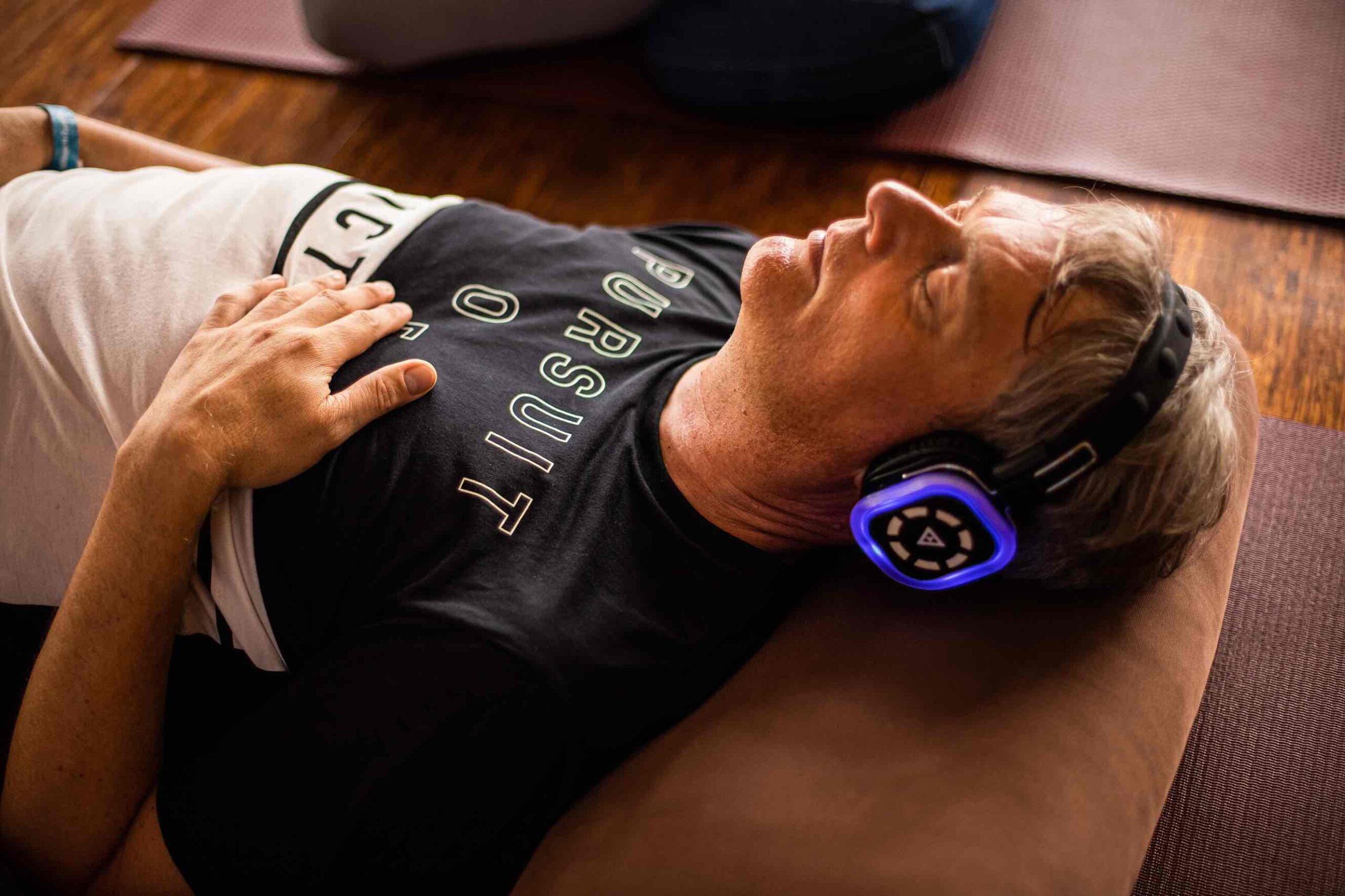From the foundations of self care to advanced wellness practices, discover how simple lifestyle habits for mental wellbeing, such as breathwork and meditation, can profoundly influence your mental wellbeing.
6 Lifestyle Habits for Improved Mental Wellbeing
Your lifestyle habits for mental wellbeing and health are undoubtedly the most valuable asset you possess. A healthy mind allows you to pursue your dreams, reach your goals, cultivate meaning and connection, and, perhaps most importantly, enjoy your life. During times of high stress, unhealthy habits creep in and rob you of your vitality and autonomy. This makes creating healthy, life giving habits, and deeply embedding them into your way of being, of utmost importance. Habit will be there when nothing else is, so make sure that your habits serve you.
Today we’re sharing six expert wellness tips on how to improve your mental health for more consistent and sustained mental wellbeing.
How to create healthy habits
The secret of change is to focus all of your energy, not on fighting the old, but on building the new.
– Socrates
If you’ve decided to start prioritizing your mental wellbeing, it can be easy to recognise all the unhelpful lifestyle habits you’ve established and get caught up in trying to put an end to them. To successfully implement new habits, however, your focus should be on introducing good things into your life, which creates a sense of excitement and inspiration, rather than trying to quit all the unhelpful things, which will most likely leave you feeling empty and lead to dopamine cravings – keeping you in a cycle of trying and failing. Remembering that you most likely developed those “bad” habits in an attempt to self soothe and regulate your nervous system will help you adopt an attitude of gentleness and self compassion. As you implement healthy habits and start to feel better, the unhelpful habits will most likely fall away naturally with time.
For this reason, we recommend making a list of the areas of your life you feel could benefit from a review, and then deciding what healthy habits you would like to implement to do this. Get as specific as possible and break your goals down into small, achievable action steps. Once you’ve done this, prioritize your list, and begin the process of setting one achievable goal each week or month. For example, your goal for week one might be to drink 2L of lemon water a day. Once this has become a part of your daily routine, you might want to set yourself the goal of going for a 20 minute walk each day. Cement each goal before moving onto the next, and within a month you could have implemented four healthy habits into your lifestyle!
Many people wanting to improve their health dive head first into a complete lifestyle overhaul, only to become overwhelmed and give up a few days or weeks into it. The method of habit building we’ve shared is a more realistic and manageable way of improving your lifestyle over time.
Habits for improved mental wellbeing
Here are some foundational lifestyle habits you can implement to significantly improve your mental wellbeing:
1. Prioritize good nutrition
Several studies have found that the state of your gut bacteria has a direct effect on your mood and mental health, meaning that the food you eat can have a tremendous impact (either positively or negatively) on the way you perceive yourself and the world around you. This implies that bringing in healthy foods and limiting or avoiding unhealthy foods should be one of the first steps you take in improving your mental wellbeing. The difficulty here is that those suffering with poor mental health may find it challenging to implement healthy eating habits, and may use unhealthy foods, or unhealthy eating habits, as a way to temporarily boost their mood or manage their emotions. As mentioned, we recommend starting small and adding good things into your diet one at a time. Within a few days and/or weeks, significant changes will be more mentally approachable.
Ofcourse, healthy eating is an incredibly broad subject matter and means something different to each person. For this reason, we recommend working with a trusted health practitioner, as well as doing your own research and testing to establish what foods and ways of eating help you feel your best. Generally speaking, a healthy diet:
- Is nutrient rich and based on whole foods– consumed as close to their natural form as possible
- Includes a variety of fresh fruit and vegetables
- Limits ultra-processed foods, as well as refined oils and sugars
- Prioritizes adequate hydration
- Addresses allergies and sensitivities
2. Exercise regularly
Regular exercise is one of the best ways to manage symptoms of stress and boost endorphins. In fact, studies have shown that exercise has a similar effect to antidepressants for those with major depressive disorder, and that 12 weeks of vigorous exercise for 30 minutes at a time, three to five times a week, reduced symptoms in patients by up to 47%! Exercise offers a range of mental health benefits, including:
- A greater sense of health and wellness
- Increased levels of self esteem and motivation
- Decreased stress levels
- Longer and more restful sleep
If you find yourself in a bad place mentally, you may be experiencing symptoms such as lethargy and fatigue, lack of motivation, and intense overwhelm – which can make exercising extremely challenging. This makes it important to choose a form of exercise that you find both enjoyable and achievable. If running and strength training seem too overwhelming, you may want to join a walking club, sign up for a membership for online yoga classes, dance in your living room, garden, or take your dog to the beach. Even a few minutes of stretching during work or before bed can help boost your mood – just do whatever you can manage.
If you use exercise as a way to self soothe you may find yourself relying excessively on it, which could lead to over exercising. In this case, you’ll need to focus on exercising as a means to feel good (not pushing yourself too hard) and prioritize adequate rest. You may also find it helpful to work with a health professional to establish what a healthy exercise routine looks like for you, and to educate yourself on the signs and symptoms of overexercising to ensure your exercise routine is serving your wellbeing in the long run.
3. Practice sleep hygiene
Along with nutrition and exercise, good sleep is a foundational aspect of mental and physical health, and should be prioritized when trying to improve and maintain your mental wellbeing.
A 2021 study in the United States included data from over 270,000 adults, and found that people who averaged six hours of sleep or less per night were 2.5 times more likely to experience frequent mental distress than those who averaged over 6 hours of sleep. Sleep deprivation and disturbed sleep has been linked to both the onset and worsening of a range of mental health issues, including psychotic episodes and suicidal ideation.
You can practice good sleep hygiene by:
- Avoiding caffeine after 3pm
- Establishing a regular sleep pattern by aiming to wake up and go to sleep at the same time every day
- Prioritizing a minimum of 7 hours of sleep per day (keeping in mind that woman may require up to 10 hours of sleep per night, due to hormonal demands)
- Regulating your circadian rhythm by getting morning sunlight and limiting blue light exposure in the hours before bed
- Reducing nicotine and alcohol, which has been proven to disrupt sleep
4. Cultivate a self-care routine
Self care refers to the actions you take to tend to your mental and physical needs. Things on this list such as eating well, exercising regularly, and prioritizing sleep are all fundamental aspects of self care. When your mental health is suffering, focusing on the basics is the most helpful thing you can do. When you have the capacity to increase your self care, you may look into things that help you function more optimally and sustainably. Things like regular meditation, daily breathwork, seeing a trusted mental health practitioner, and adding activities into your life that bring you joy will help you mentally establish a new baseline so that you can experience greater mental wellbeing on a more consistent basis.
Take a deeper dive into How to Cultivate a Self-Care Routine to improve your mental health.
5. Limit social media usage
Social media, while designed to bring people together, is not a replacement for real world connection. Human beings are social creatures and connection is a core need. Unfortunately, in today’s world our virtual reality plays just as, if not more of, a role in our daily lives and social networking. This has had a devastating impact on the mental health of hundreds of thousands of people across the globe.
Frequent use of social media has been linked to increased risk of depression and anxiety, sleep disturbance, and feelings of loneliness. Viewing the highlights of other people’s lives and comparing your life to what you see on social media can lead to feelings of inadequacy and isolation, fear of missing out, cyberbullying, self absorption, and more.
This makes it a necessity to create healthy boundaries around social media usage and engagement. This includes limiting the amount of time you spend on social media (experts recommend no more than 30 minutes per day), turning off notifications linked to digital media platforms on your devices, prioritizing real-world interactions, doing regular digital detoxes, and replacing excessive scrolling with more meaningful activities.
6. Create time for your relationships
Your relationship to yourself, as well as your relationships with those who offer meaning, value and support in your life are equally important to your mental wellbeing. When suffering from depression, anxiety, or high stress levels, it can be easy to either neglect your relationships and social needs by not responding to messages and calls, rejecting invitations, and going into a space of isolation; or to neglect your relationship with yourself by using people and events as a way to avoid being alone and dealing with the things that are causing you distress.
To avoid this, it’s best to spend quality time with both yourself and the important people in your life. Quality time with yourself may include self care, dedicated relaxation, and tending to the things that are causing stress in your life, such as your mental state, unfinished tasks and chores, as well as carving out time to practice mindfulness so that you can maintain a connection to your needs, goals and dreams, and values.
Time spent nurturing positive friendships and connections can ease feelings of loneliness, meet your needs for emotional support, and add meaning and purpose to your life. Research shows that socializing decreases the hormones related to anxiety, and increases oxytocin, leading to a feeling of safety and belonging, as well as regulated emotional responses.
Cultivate inner space with The Pantheon Method
Discover the benefits of meditation with The Pantheon Method. Our guided meditation and breathwork program is based on ancient yogic technology designed to improve your mental wellbeing and activate states of flow. Implement The Pantheon Method effortlessly into your self care routine by signing up to our online membership.




